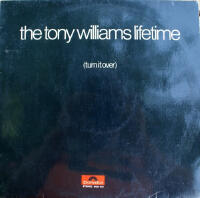
Turn it over
Vinyl LP.
Nära nyskick. LP, Polydor 2425 019 (1970 / 1970). Trumslagaren Tony Williams värvades till Miles Davis kvintett redan som tonåring och tillsammans med Wayne Shorter, Herbie Hancock och Ron Carter skapade han musik på en svindlande nivå. Han var en viktig del i Miles utveckling mot en ny musik där jazzen förenades med inslag från rock, soul och funk. Tony Williams lämnade Miles i slutet av 60-talet och bildade en egen fusion-grupp, Tony Williams Lifetime.I den upplaga vi hör på detta album ingår John McLaughlin g, Larry Young org och Jack Bruce b. I baksidestexten uppmanas vi att spela sid A "very loud" och sid B "very very loud"."The better of the two albums the Tony Williams Lifetime recorded in 1970, Turn It Over, is a far more focused and powerful album than the loose, experimental Ego, and one of the more intense pieces of early jazz-rock fusion around. In parts, it's like Jimi Hendrix's Band of Gypsys with much better chops. It's more rock-oriented and darker-hued than their debut, 1969's Emergency!, and the temporary addition of ex-Cream member Jack Bruce on bass and vocals alongside stalwart guitarist John McLaughlin makes this something of a milestone of British progressive jazz. The album's primary flaw is that unlike the expansive double album Emergency!, these ten songs are tightly constricted into pop-song forms -- only a swinging cover of Antonio Carlos Jobim's "Once I Loved" breaks the five-minute mark, and then only barely -- which reins in these marvelous soloists too much. This is particularly frustrating since pieces like the two-part "To Whom It May Concern" feature some outstanding solos (especially from McLaughlin and organist Larry Young, the group's secret weapon) that are frustratingly, tantalizingly short. Expanded to a double album, Turn It Over would probably surpass Emergency! as a pioneering jazz-rock fusion release; as it is, it's an exciting but mildly maddening session." (Stewart Mason, allmusic.com)10 spår; speltid 38+ min. Vinyl Nära nyskick . Tysk pressning.









